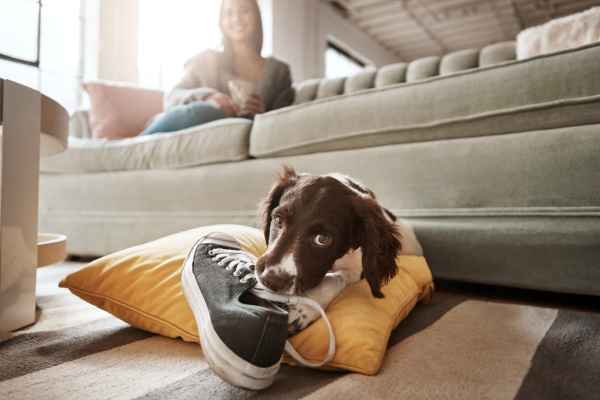-
What is separation anxiety?
Separation anxiety is one of the more common forms of anxiety in pets. It occurs when a pet is separated from its owner and begins to feel anxious or stressed. In some cases, it can be debilitating and render a pet susceptible to emotional and health problems.
What causes separation anxiety?
While the causes of separation anxiety are not fully understood, it is apparent that genetics and environmental factors play a role. Common causes include:
- A change in ownership
- Being left alone longer than usual
- A relocation to a new house or area
- The loss of a household member
- Getting constant attention with no focus on independent play
- Not getting enough stimulation and enrichment
What are the signs of separation anxiety?
When a dog is feeling stressed due to being left alone, they may display signs of separation anxiety. These include:
- Destroying clothing, furniture, or bedding
- Chewing on door frames, windowsills, or household objects
- Urinating or defaecating inside
- Barking or howling excessively
- Trying to escape through excessive digging or scratching
- Clinging to its owner and panting or whining
How can we help our dogs with separation anxiety?
Dogs have several basic needs to support their wellbeing. These include regular exercise, mental stimulation, rest and sleep, and social interaction and affection. In addition to these, dogs with separation anxiety also need a little extra care to help them feel comfortable when we, their owners, are away from home. Here are a few things that can help with separation anxiety.
- Positive enrichment. A mentally or physically stimulating puzzle feeder, object or toy that encourages your pet to use their brain and problem-solve to access food. This will help keep your dog stay busy and stimulated.
- Dog toys. Select a few valuable toys and keep them on a rotation every week or two to help stop your pet getting bored. Having more than a couple of toys around the house can add to your dog’s stress as they may become overwhelmed.
- Adequate exercise. If you don’t have time to walk your dog every day, consider finding a professional dog walker.
- Spend time alone, together. Ideally, your dog shouldn’t know your whereabouts all the time. Try shutting yourself in a different part of the house so they can’t hear you moving about. Opening and closing doors randomly may also help your dog disassociate the action with you leaving or arriving home.
- Avoid making a fuss when you leave or return home and instead pay them attention when they are in a calm state. Do not reward behaviours such as jumping up, pawing, or whining. Training your dog to sit calmly and rewarding them for relaxed behaviour is essential to managing separation anxiety.
You can also explore behavioural therapy from a specialist to help deal with separation related problems. This can include strategies for reducing dependency of the dog on the owner and providing activities for the dog while alone.
Your vet may also prescribe behavioural-modifying medications as you navigate through these management techniques.
If you’re putting in the hard yards to care for your dog, it’s a good idea to be prepared for the unexpected. Medibank Pet Insurance can cover your pooch for a range of specified illnesses and accidentsꭥ , and policies with Extra Care can also cover specialised therapies and treatment of specified dental conditions. † This can include consults with behavioural specialists. Plus, Medibank health members save 10%.#
Does your dog have separation anxiety?


Looking for Pet Insurance?
They bring out your best. Help protect them with Medibank Pet Insurance.
Three updated cover levels now available!ꭥ Plus, health members save 10% on premiums.# T&Cs apply.
ꭥ Policy T&Cs, limits, exclusions and waiting periods apply. Sub-limits and excess may apply. Extra care limit may apply (where applicable).
† Extra Care is an included additional benefit with the Pet Max plan and an optional benefit available with Pet Protect and Pet Plus. See PDS for more information.
# Eligible Medibank and ahm health members who wish to activate this discount must provide accurate membership details: (a) at point of purchase for the discount to apply; or (b) prior to renewal for the discount to apply at renewal.
Things you should know
Medibank Pet Insurance policies entered into for the first time prior to 30 August 2023 and subsequent renewals of those policies are issued by The Hollard Insurance Company Pty Ltd ABN 78 090 584 473, AFSL 241436, arranged and administered by PetSure (Australia) Pty Ltd ABN 95 075 949 923, AFSL 420183 (PetSure) and promoted and distributed by PetSure’s Authorised Representative (AR) Medibank Private Limited ABN 47 080 890 259, AR 286089 (Medibank).
Medibank Pet Insurance policies entered into for the first time on or after 30 August 2023, and subsequent renewals of those policies are issued by PetSure and promoted and distributed by PetSure’s AR, Medibank.
Any advice provided is general only and does not take into account your individual objectives, financial situation or needs. Please consider the Product Disclosure Statement (PDS) ensure this product meets your needs before purchasing, or choosing to continue with the product. PDS and Target Market Determination available at medibank.com.au/pet-insurance.
